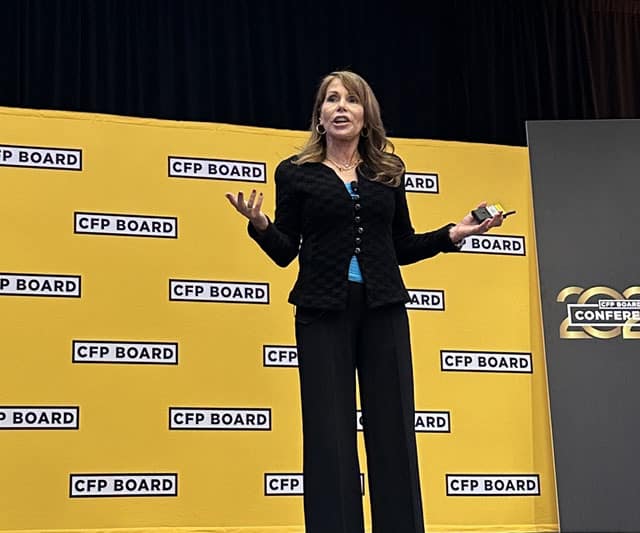Maddy Dychtwald says the financial industry needs to cast aside its man-centric focus and better serve women, and that goes for women executives in the sector who, she says, continue to defer to their husbands in financial matters.
The author, speaker and researcher throws down that gauntlet in new her book, “Ageless Aging: A Woman’s Guide to Increasing Healthspan, Brainspan, and Lifespan,’’ from Mayo Clinic Press, is due May 14 and may be pre-ordered. Dychtwald co-founded the company Age Wave in 1986 with her husband, Ken Dychtwald, to focus on longevity, retirement, the changing role of women and other issues.
In her book, co-authored with Kate Hanley, Dychtwald shares research, scientific findings and professionals’ perspectives on how to resolve the income disparity between women and men; steps to attain financial well-being; how hormones affect aging women and men; devising an eating plan for brain, body and emotional health, and the role of exercise for healthy older age.
Dychtwald has been featured in Bloomberg Businessweek, Forbes, Newsweek, Time, CNBC, and NPR and has written blog posts for the Wall Street Journal and Huffington Post. Her previous books include “Influence: How Women’s Soaring Economic Power Will Transform Our World for the Better;’’ “Gideon’s Dream: A Tale of New Beginnings’’ (a children’s book), and “Cycles: How We Will Live, Work, and Buy.”
She recently spoke to Rethinking65.com from her home in San Francisco, where she lives with her family.
Eleanor O’Sullivan: For your book, you spoke to many experts, including physicians, researchers and scientists, most of whom are women. Was it deliberate to make women the majority of voices?

Maddy Dychtwald: When I looked into the whole field of aging and longevity, I noticed that all the authors were guys. I felt like there was something wrong with this picture, and I wanted to change it. In a way, I guess I’m the right person at the right time for this book, because here I am, 74, having gone through physical challenges myself.
Right here, I want to say that men are terrific, but there are not a lot of them who are expert resources for women. I have great respect for Andrew Huberman and Peter Attia, two longevity experts, but they recently did a podcast episode on women’s hormones and menopause. When I saw that, I said, “How can these two guys talk about what goes on for a woman during menopause?”
I wasn’t aware of it before, but there are a lot of women experts who are cutting edge. You just don’t hear from them so often. I set out to put them on a platform, to give them a place to put out their best ideas. When we were just starting the book, I wasn’t sure who would agree to be part of it. But people were enthusiastic, really wanting to take part. So, it became a book by women, for women and with many women voices.
O’Sullivan: You sharpen the impact of your book with anecdotes about your personal experience, including your hip replacement surgery, assuming responsibility for your own investing, deciding to limit your alcohol intake, applying what you learned from your mother’s Alzheimer’s disease to your life, discussing your struggle with inadequate sleep, etc. Was it difficult to be so revealing? Do you think it’s important for women to be open about their problems?
Dychtwald: It’s a big subject: I don’t want to diminish the importance of it. I have gotten uncomfortable revealing weak spots, but then I realized by doing so, the more authentic, the more real I got. The fact is, getting older is filled with dodgeballs, all kinds of things that will come at you. Unless we talk about the weak spots and come clean, we are not going to be able to help each other.
We have to be open, or how else are we going to help younger women come to grips with what is to come? We’re seeing things change. Take menopause. Women in their 40s and 50s are saying, “Wait a minute. This whole menopause thing, why are we not talking about it openly?” They want us to tell them about this thing that happens to you and is dramatic, because it affects your cognitive productivity, besides being uncomfortable. It’s a huge health concern that we are not paying attention to.
Our health care system is still dramatically leaning in to helping men more than women. Don’t get me wrong, men are great, and most doctors are very well meaning, but they’re very busy, and they don’t have time to look at most of research. Honestly, the whole system was created by men, so it’s got a myopic perspective about women. We need to change that.
O’Sullivan: Your book tells readers that there are several options for getting financial advice/management, including hiring a financial advisor — “one you can trust.’’ How often do you hear that advisors are not trustworthy, or reliable? Aside from “being invisible,’’ is trust one of the reasons women often fire their FA when their husband/partner dies or they divorce?
Dychtwald: We [Age Wave] have done studies on this. Women have said they were often misunderstood and under-represented by the financial services industry. They described the financial industry as a whole as not welcoming and patronizing, and very male-oriented, so, that is not good news.
In addition, 70% of these women, in a study of women from cross-racial and economic levels, said the financial advisory industry focused on men’s salaries, career paths, preferences and lifestyles. We know that women live longer, spend more years in retirement, retire earlier and live on two-thirds of the savings of men. That is not the path to success, it’s bad for women, and oftentimes, there is no one to turn to, to help make this better.
Since the 2008 financial debacle, that is when men got up to the plate and said they didn’t know what the hell they were doing, and they would like to have their partner involved in financial decisions. Another study found that the majority of couples — men and women — want to work together on financial planning.
I won’t blame all of that on the financial advisory industry. We women have to take some of the responsibility. A decade ago, we knew that women had become a major economic power around the world. I’ve talked to a lot of women executives in the financial services industry, and even there, many admitted that they deferred to their husbands for making financial decisions. They were too busy because they were taking care of work, taking care of a family and taking care of a parent or older family member. So, who has the time?
Finding an advisor
How do you find an advisor you can trust? Word of mouth is a good way. But how do you find women who will recommend an advisor? Studies find that women don’t like to talk about money; they’d rather talk about death. If they could talk about how much they make, how much they invest — that would be a huge step. Of those who do share information, women are far more likely to suggest their financial advisor to their friends and family, and women do follow through on advice, which men don’t always do.
I have had two financial advisors in my life, one of whom was stereotypical — he didn’t pay much attention to me at all. It was really annoying. A long time ago, when I started to understand the ramifications of not taking part in my financial future, I realized it was something I was really, really going to come to regret. I told my husband this was not working for me, so we fired him. The person we have now is ethical, super trustworthy and a bit conservative. He’s a great listener.
And women advisors?
There still aren’t that many women advisors, but I would say that you need to put a woman advisor to the same kind of rigor when interviewing them as you would a man. A study of older women done some years ago found that these older women were more likely to trust a male advisor; they said they were like sons to them.
As I say in the book, a financial advisor plays a very serious and important role, and it’s not just about finance. It’s about a client’s health, or maybe they have to explain Medicare to you, or they should be talking about Social Security, and about women’s goals and purpose. Women taking financial responsibility is a rather new thing, because we are very busy doing a lot of other things. But we still want to find a sense of purpose in our lives, and we need to be planning for our future in retirement, and that is where financial advisor can be an incredibly valuable resource.
O’Sullivan: You talk about the disparity between women’s and men’s earning power; lost earned income from this disparity and from work absences due to personal responsibilities; and reduced income from Social Security, 401(k)s and IRAs. Do you see these disparities improving in your children’s generation? How are the younger women you know dealing with these disparities? Has it created tension between younger women and men?
Dychtwald: My daughter is about to turn 37, my son next week is turning 34. My daughter has become a pretty good negotiator for herself. But on average, women are still earning 82 cents to the dollar for men, until 2056, unless we stake steps to change that. For some reason, that is not happening. Loss of income has a multitude of ramifications. It affects our Social Security, our ability to save for 401(k)s and IRAs.
It’s great that in our children’s generation, women go to college in much higher numbers, but it still takes them longer to get into the workplace, and they struggle to invest in their future, especially because of student loan debt. Many younger women are opting to hold off on getting married and having a family or not to do it all if they choose. But women are generally still the primary caregivers, and that often takes them out of the workforce, at least part of the time.
When my kids were growing up, I was trying to be an entrepreneur, and I was traveling all the time, but it got to the point when my husband and I recognized something had to give. We didn’t want our kids to grow up and have problems, so I chose to work part time. Did that affect my career and my earning power? Absolutely, 100%. My son, who is married, is very supportive of women. He totally supports his wife’s work, which requires that she travel a lot. But on the other hand, he has the greater earning power, so he subsidizes her work.
Final thoughts
When my generation was entering the workforce and we were trying to move up the ladder to success, we found only one or two women at the top of the food chain, which created a bit of a competitive environment for women. But that is changing, and women are far more supportive of other women’s success. That is a good thing!
Dychtwald’s latest book can be pre-ordered here.
In a four-decade career in journalism, Eleanor O’Sullivan has reviewed many books on best practices for financial advisors, has written for Financial Advisor and the USA Today network, and was movie critic for the Asbury Park Press.







